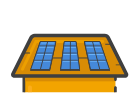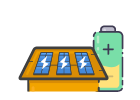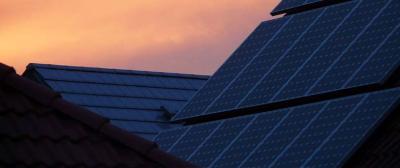Solar Panels in the UK: A Comprehensive Guide (2025)
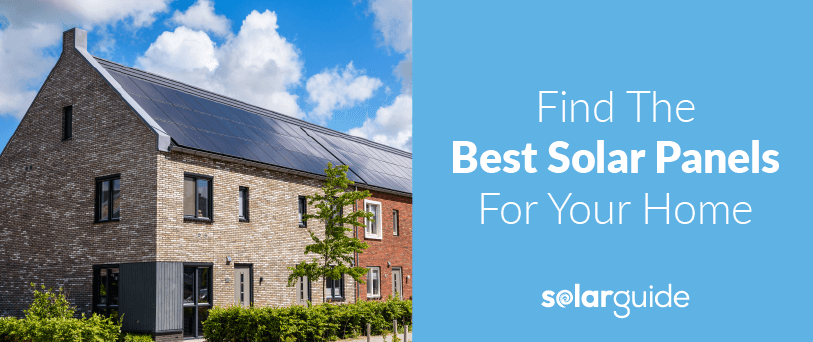
Visualise the feeling of basking in the sun’s warm glow, knowing that every day is brightening your day and powering your home. Solar panels have revolutionised how we harness energy, offering homeowners an eco-friendly and cost-effective solution. If you’ve ever considered taking the leap into solar power, then you’re in luck! Today, we’re here to guide you through the process of finding the best solar panels for your home.
It’s worth noting, that the following article has general information about solar panels but also assumes you live in a detached house. We have another page where you can learn more about solar panels for flats and apartments in the UK since this can present different challenges.
Whether you’re a novice exploring the world of renewable energy or a seasoned green energy enthusiast, our service is designed to satisfy your needs. Our dedication to delivering the best possible solutions for your solar panel installation sets us apart. We understand that choosing the right panels can be confusing, with countless online options. That’s why we’ve carefully curated a network of professional solar panel installers across the UK who are ready to assist you every step of the way.
With our vast network, you can rest assured that you will be connected to an expert who is knowledgeable about solar panel installation and can guide you towards the best solution for your specific needs.
But one of the greatest advantages of choosing Solar Guide is the speed and convenience we offer in getting you a quote once you fill out our form. Within 48 hours of filling out our quick and easy form, you will receive up to 4 quotes from trusted solar installers near you. These quotes are free and come without any obligation, allowing you to make a knowledgeable decision without any pressure.
So why wait? Fill out our quote form now, and let us connect you with your area’s best installers.
Get Free Solar Panel Quotes: Get quotes and compare prices.
How do solar panels work?
These remarkable devices allow us to convert sunlight directly into electricity, providing a clean and renewable power source for our homes and businesses. Let’s take a closer look at how solar panels, specifically solar photovoltaic panels (PV panels), work their magic.
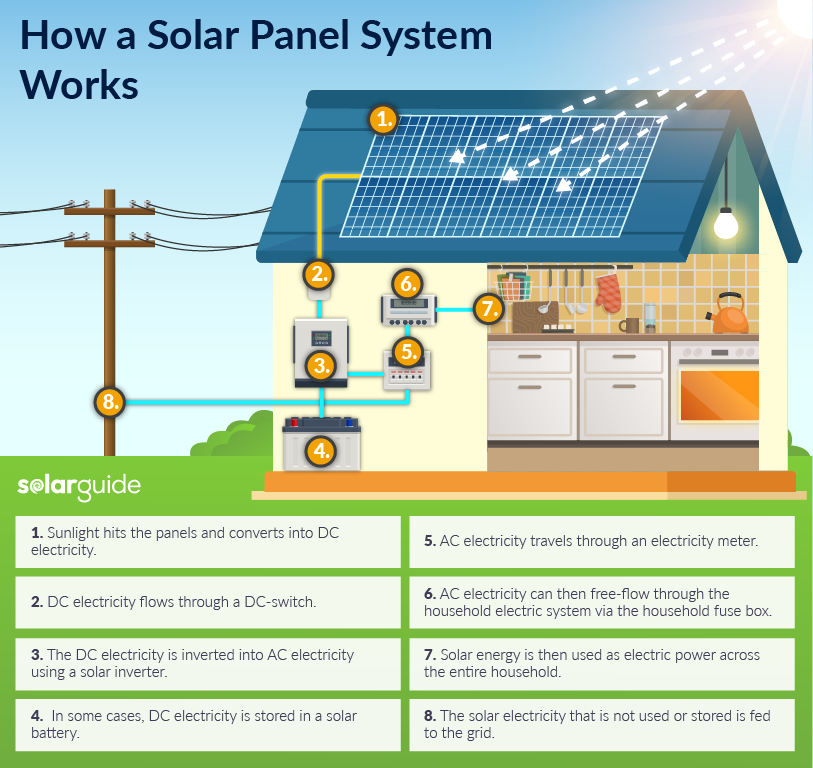
Solar photovoltaic panels (PV panels)
Solar photovoltaic panels are the most common type of solar panels used for generating electricity. They consist of several interconnected solar cells made from semiconducting materials, usually silicon. These cells convert sunlight into electrical energy through the photovoltaic effect.
To visualise the process, here’s a simple table summarising the steps involved in converting sunlight into electricity using solar panels:
| How do solar panels work?: Step by step | |
|---|---|
| Step | Description |
| 1. Absorption of Sunlight | Solar cells absorb photons from sunlight. |
| 2. Generation of Electric Field | Photons transfer energy to electrons, creating an electric field. |
| 3. Separation of Charge | Electrons and “holes” are separated by the electric field. |
| 4. Collection of Electrons | Electrons are collected by metal conductive plates. |
| 5. DC Conversion | Direct current (DC) electricity is produced. |
| 6. Inverter Conversion | DC electricity is converted to alternating current (AC). |
| 7. Energy Consumption or Grid Connection | Electricity powers appliances or is fed back into the grid. |
- Absorption of Sunlight: When sunlight hits the solar panel, the cells absorb the photons (particles of light) present in the sunlight.
- Generation of Electric Field: The absorbed photons transfer their energy to electrons in the semiconducting material, allowing them to break free from their atomic bonds and create a flow of electric charge.
- Separation of Charge: The electric field within the solar cells separates the freed electrons from the positively charged “holes” left behind, creating a voltage potential across the cell.
- Collection of Electrons: The freed electrons are directed by the built-in electric field towards conductive metal plates on the surface of the solar cells. These metal plates collect the electrons, creating an electric current.
- Direct Current (DC) Conversion: Collected current is in the form of direct current (DC), the same type of electricity that batteries produce.
- Inverter Conversion: Since most household appliances and the power grid operate on alternating current (AC), the DC electricity produced by the solar panels is converted into AC by an inverter. This allows for seamless integration with the existing electrical systems.
- Energy Consumption or Grid Connection: The numerous electrical appliances in your home or business premises can then be powered by converted AC electricity. Suppose the solar panel system generates more electricity than you need. In that case, the excess power can be fed back into the grid, often earning you credits or compensation from your energy provider.
How much do solar panels cost in the UK?
Suppose you’ve been considering investing in solar panels for your home in the UK. You could be concerned about the associated costs in that situation. The best part is that solar panel prices have dramatically dropped over time, making them more readily available and reasonably priced for households.
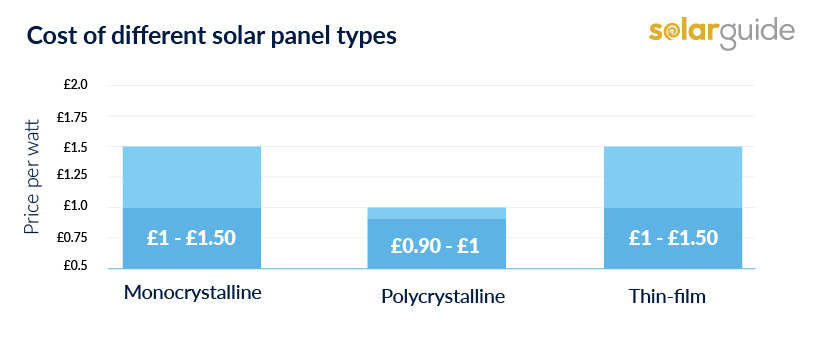
The average costs per type of solar panel (Per watt)
The graph highlights the average costs of various types of solar panels commonly used in the UK. Here is a list of the many varieties and their typical prices:
- Monocrystalline Solar Panels:
Average Cost: £1 to £1.50 per watt
Description: Monocrystalline panels are known for their high efficiency and sleek appearance. They are made from a single crystal structure, resulting in a uniform look and excellent performance in direct sunlight. - Polycrystalline Solar Panels:
Average Cost: £0.90 – £1 per watt
Description: Polycrystalline panels are made from multiple crystal fragments, which are fused together. While they may be slightly less efficient than monocrystalline panels, they offer a cost-effective option with good overall performance. - Thin-Film Solar Panels:
Average Cost: £1 – £1.50 per watt
Description: Thin-film panels are lightweight and flexible, making them suitable for various applications. They are typically less efficient than crystalline panels but offer advantages in terms of aesthetics and installation versatility.
Solar panel installation costs
Solar panel installation costs can vary significantly based on several factors, including the installation type and the system size. Here is an outline of the average costs associated with different types of solar panel installations:
- Residential Rooftop Installation: Residential rooftop installations are the most common type of solar panel installation. The cost typically includes solar panels, mounting equipment, wiring, and labour. On average, the installation costs for residential rooftop systems range from £2,500 to £10,500, depending on the system’s size and the installation’s complexity.
- Ground-Mounted Installation: Ground-mounted solar panel installations are ideal for properties with ample available space. These installations require additional materials for mounting the panels on the ground. The cost of a ground-mounted solar installation ranges from £2,800 to £12,100, depending on the system’s size (starting from a 5kW solar system to a 15kW system size) and the need for ground preparation.
- Solar Canopy Installation: Solar canopies are an innovative solution that combines solar panels with shading structures. These installations are commonly used in parking lots, recreational areas, and commercial buildings. Solar canopy installation costs vary based on size, design complexity, and additional features. On average, the cost ranges from £2.13 to £2.53 per watt (hence, a 4kw solar system size is £5,000 – £6,000).
- Off-Grid Installation: Off-grid solar panel installations are designed to provide electricity in remote areas without access to the traditional power grid. These systems require additional components, such as batteries and inverters, to store and convert the generated electricity. The costs for off-grid installations can range from £5,500 to £10,500, depending on the system size (2.5kw - 10kw) and the required energy storage capacity.
- Utility-Scale Installation: Utility-scale solar installations are large-scale projects that generate electricity for the grid. These installations involve complex engineering, advanced tracking systems, and high-capacity inverters. The costs associated with utility-scale installations can vary greatly depending on project size, location, and other factors. On average, these installations can cost several million dollars.
It is crucial to note that these cost estimates are general ranges and may vary based on factors such as geographic location, local regulations, and equipment quality.
That’s why getting multiple quotes from local installers is important to ensure the best possible outcome. However, the process of finding various installers in your vicinity can be time-consuming and stressful and ultimately result in not securing the most advantageous options.
Therefore, relying on SolarGuide to facilitate this task on your behalf is crucial. By availing our services, you will be relieved of the burden of extensive research or calling them individually. We can connect you to the most exceptional solar installers in your area, and the best part is that it is entirely free.
By obtaining multiple quotes through SolarGuide, you open yourself up to incredible deals on solar panels. There is nothing to lose and much to gain, so take the first step by clicking the button below to get started.
Get Free Solar Panel Quotes: Get quotes and compare prices.
How many solar panels do you need for your home?
Determining the number of solar panels required to power your home is crucial in planning your solar energy system. If you need to determine “How many solar panels do I need in the UK?”, we have a dedicated page for that. Several factors influence this calculation, ensuring you have the right number of panels to meet your energy needs efficiently. Factors Influencing the Number of Solar Panels:
- Energy Consumption: The amount of electricity your household consumes significantly affects the number of solar panels needed. A higher energy consumption will require a larger solar panel system to generate sufficient electricity to meet your needs.
- Sunlight Availability: The amount of sunlight your rooftop receives throughout the year affects the efficiency of solar panels. Regions with more sunlight typically require fewer panels compared to areas with less sunlight. It’s important to consider factors such as shading from nearby buildings or trees that could impact solar panel performance.
- Roof Size and Orientation: The available roof space and its orientation toward the sun are crucial factors. A larger roof area allows for the installation of more panels, while an optimal orientation (typically facing south in the Northern Hemisphere) maximises solar energy capture.
- Panel Efficiency: The efficiency of solar panels influences the number required to generate a specific amount of electricity. Higher efficiency panels produce more power per unit area, requiring fewer panels overall. However, higher-efficiency panels may come at a higher cost.
- Desired Energy Offset: Consider the percentage of your electricity bill you wish to offset with solar power. Some homeowners aim to offset their energy consumption completely, while others may opt for a partial offset. Your desired energy offset will determine the size of the solar panel system required.
- Battery Storage: If you plan to incorporate battery storage in your solar energy system, additional panels may be needed to ensure you can charge the batteries and meet your energy needs during periods of low sunlight or power outages.
| Calculation of the Number of Solar Panels needed (system sizes) | ||
|---|---|---|
| System size | Number of panels needed | Estimated annual production |
| 4 kW | 10 | 3,400 kWh |
| 6 kW | 15 | 5,100 kWh |
| 8 kW | 20 | 6,800 kWh |
| 10 kW | 25 | 8,500 kWh |
| 12 kW | 30 | 10,200 kWh |
*Based on 400W solar panels
Note: Considering these factors, you can make an informed decision and take a significant step towards a sustainable energy future for your home.
Are solar panels worth it?
As the world increasingly embraces renewable energy, many homeowners are considering solar panels as a way to reduce their carbon footprint and save on energy costs. However, you may wonder if solar panels are worth the investment. Let’s help you evaluate the value and benefits of installing solar panels for your home by considering these below.
Solar panel efficiency: Are solar panels efficient in the UK?
Yes. While the UK may not be known for its abundant sunshine, modern solar panel technologies are designed to generate electricity even in cloudy or overcast conditions. Solar panels can adapt to seasonal changes in sunlight intensity. They continue to produce electricity during winter months, although at a slightly reduced rate compared to summer. Over the course of a year, solar panels can still generate a significant amount of clean energy.
Though, the overall efficiency of a solar panel system also depends on factors such as inverter efficiency, wiring quality, and system design. Working with reputable solar panel installers ensures optimal system efficiency. So, considering these points, solar panels in the UK can still provide a valuable and efficient source of renewable energy.
How much do I save by installing solar panels?
Solar panels offer significant long-term savings on electricity bills, allowing homeowners to reduce or even eliminate their reliance on the grid. The exact amount of savings depends on several factors, including Energy consumption, system size, energy usage patterns, net metering, and more. While the exact savings depend on those factors, here are some key estimates of how much solar panels can save you on your energy bills in the table below.
| Key estimates of how much solar panels can save on your energy bills | ||
|---|---|---|
| System size | Energy generated per year | Potential energy bill savings |
| 3kW | 2,550kWh | £400 |
| 4kW | 3,400kWh | £600 |
| 5kW | 4,250kWh | £600 |
| 6kW | 5,100kWh | £1,0125 |
Are there solar panel grants available in the UK?
The UK government offers various solar panel grants and incentives to promote the adoption of solar panels. These initiatives aim to support homeowners in their transition to clean energy and further enhance the worth of solar panel installations. It’s worth noting that, different regions have different grants. For example, grants for solar panels in Scotland can vary heavily from ones in Wales.
Currently, the main grant available in the UK is the Smart Export Guarantee (SEG), Warmer Homes Scotland, Home Energy Scotland Programme, and Energy Company Obligation 4 (ECO4), which ensures that homeowners can afford solar panel installation for their home or allows them to earn additional income on top of the savings from reduced electricity bills if you are eligible.
So, what next? SolarGuide, are committed to helping homeowners find the best solar panel solutions and connecting them with professional solar installers in their area. Using our service, you can receive up to 4 quotes within 48 hours, free of charge. This will enable you to get the best deal and take away time to be consumed searching for installers to help you. What else is unique about our service? There is no obligation to accept any of the quotes you receive. Click the button below to get started.
Get Free Solar Panel Quotes: Get quotes and compare prices.
What are the best solar panels?
Choosing the best solar panels is crucial to ensure optimal performance, longevity, and energy generation when considering solar panel installations. Let’s explore some of the top solar panels available in the UK, highlighting their unique features and benefits.
Top 7 solar panels in the UK
To help you make an informed decision, here are the top 7 solar panels that have gained recognition for their efficiency, durability, and performance:
| Top 7 solar panels in the UK | |
|---|---|
| Solar Panel Models | Key Features |
| 1. Panasonic HIT N340 | These panels are renowned for their high efficiency and excellent performance, even in low-light conditions. They are an ideal choice for homeowners with older roofs, as they offer superior aesthetics and can maximise energy generation. |
| 2. SunPower Maxeon 3 | These panels ensure optimal energy generation and have a lifespan of several decades. |
| 3. Jinko Solar Tiger Neo 72HL4: | These panels are designed to maximise energy production and provide reliable performance even in challenging weather conditions. |
| 4. Project Solar Evolution Titan 445 | These panels are designed to withstand harsh weather conditions and provide reliable energy generation for years to come. |
| 5. SunPower Maxeon 6 AC | These panels combine high efficiency with built-in microinverters, simplifying installation and improving system performance. These panels are an excellent choice for UK homes, offering enhanced energy production and ease of use. |
| 6. Panasonic EverVolt EVPV410H | Efficient but also environmentally friendly. These panels have a lower carbon footprint and are manufactured using sustainable practices, making them an ideal choice for homeowners who prioritise eco-friendly solutions. |
| 7. Q Cells Q Peak Duo BLK ML-G9 | They are built to function incredibly effectively in darkened environments. With innovative technology that minimises the impact of shading, these panels ensure consistent energy generation, even in less ideal sunlight conditions. |
What are the best manufacturers?
When it comes to choosing solar panels, the manufacturer’s reputation and track record play a significant role. Here are four leading solar panel manufacturers known for their quality and reliability:
- Jinko Solar: Jinko Solar is one of the world’s largest solar panel manufacturers, known for producing high-quality panels with excellent performance and efficiency.
- SunPower: SunPower is renowned for its industry-leading solar panel technology, offering top-notch efficiency, durability, and aesthetic appeal.
- Panasonic: Panasonic is a trusted name in the industry, producing high-efficiency solar panels focusing on quality, reliability, and long-term performance.
- Trina Solar: Trina Solar is a globally recognised solar panel manufacturer, offering a wide range of panels known for their high efficiency, durability, and competitive pricing.
Pros and cons of solar panels in the UK
Like any technology, solar panels have both advantages and disadvantages. Let’s examine the pros of solar panels and the cons as well to help you make a knowledgeable decision about their suitability for your home.
What are the advantages of solar panels?
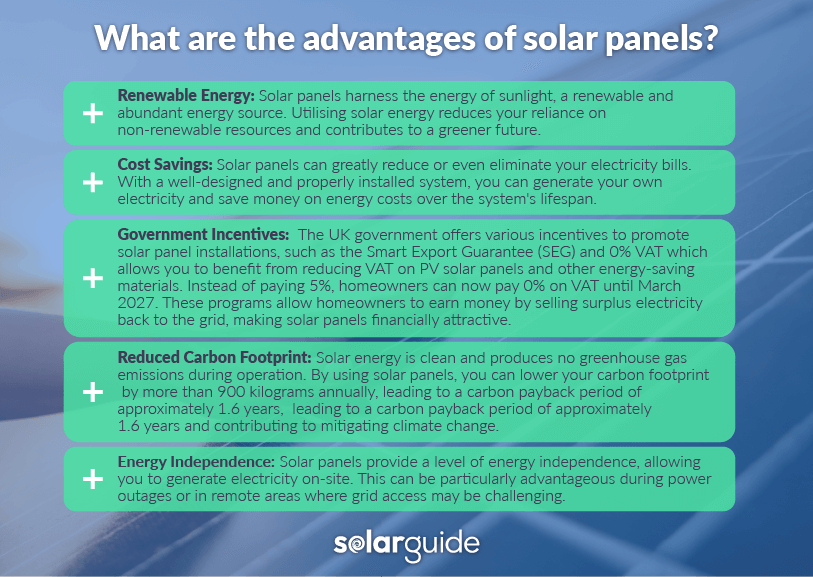
What are the disadvantages of solar panels?
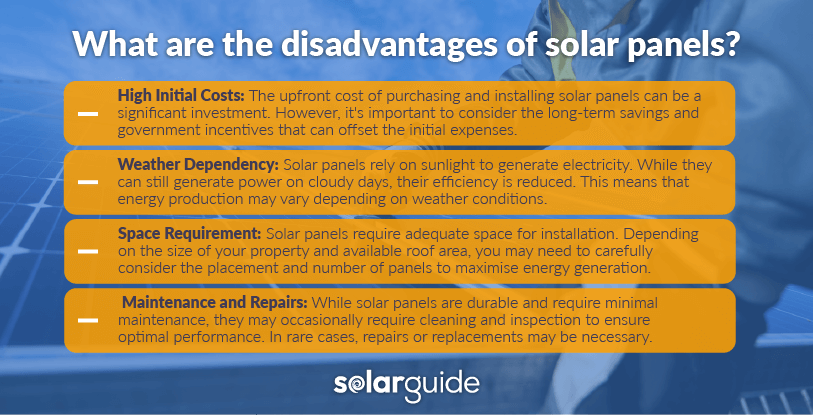
By weighing the pros and cons and consulting with a professional solar installer, you can make an informed decision about integrating solar panels into your home. But remember that Solar Guide can help you navigate the world of solar energy by getting a quote. Our service is fast and trusted. We provide up to 4 quotes to compare in a matter of 48 hours to make an informed decision. Our quotes are free, and with the help of our best installer, you can rest assured it will be tailored to your requirements. Click the button quote today.
Get Free Solar Panel Quotes: Get quotes and compare prices.
What does the installation process of solar panels look like?
Understanding what to expect during the installation can help you prepare and ensure a smooth and efficient process.
1. Site Assessment and Design
The installation process begins with a thorough site assessment conducted by a professional solar installer. They will evaluate your property’s suitability for solar panels, considering factors such as roof orientation, shading, and structural integrity.
2. Obtaining Necessary Permits and Approvals
Before installation can begin, obtaining permits and approvals from local authorities or homeowner associations may be necessary. Your solar installer will handle this process, ensuring all necessary paperwork is completed and submitted promptly.
3. Preparing the Roof
The roof has to be equipped for solar panel installation after the required permissions have been secured. This may involve cleaning the roof surface, repairing any damages, and reinforcing the structure if required.
4. Mounting the Solar Panels
The solar panels are then mounted onto the prepared roof surface. Depending on the type of installation, the panels can be affixed using mounting brackets or, in the case of integrated solar panels, installed into the roof structure itself. Proper alignment and positioning are essential to maximize sunlight exposure and optimise energy generation.
5. Electrical Wiring and Connection
After the panels are securely mounted, the electrical wiring work begins. This involves connecting the solar panels to an inverter, which converts the direct current (DC) generated by the panels into alternating current (AC) usable in your home. The inverter is typically installed near your electrical panel or in a designated location agreed upon during the design phase.
6. Grid Connection and Net Metering
If your solar panel system is grid-tied, the next step is establishing a connection to the utility grid. This allows for net metering, which enables you to receive credits for any excess electricity your system produces, which can be fed back into the grid. The net metering arrangement varies depending on the regulations and policies of your local utility company.
7. System Testing and Commissioning
The system undergoes rigorous testing once the installation is complete to ensure everything functions properly. This includes checking the electrical connections, verifying the performance of the solar panels, and conducting a comprehensive system inspection. If any issues are identified, they are addressed promptly to guarantee optimal performance and safety.
8. Monitoring and Maintenance
After installation, it’s important to monitor the performance of your solar panel system regularly. Many systems have built-in monitoring capabilities that allow you to track energy production and detect potential issues. Routine maintenance, such as cleaning the panels and inspecting the system for debris or damage, is also recommended to ensure long-term efficiency.
Does the installation of solar panels affect house insurance?
The installation of solar panels may have an impact on your house insurance. It’s essential to inform your insurance provider about the installation to ensure that your policy adequately covers the new addition to your property. Some insurance companies may consider solar panels as an improvement that increases the value of your home. In contrast, others may view them as a potential risk due to the electrical components involved.
By notifying your insurance provider, you can discuss any necessary adjustments to your policy to protect your investment in solar panels and ensure comprehensive coverage for your home.
Get the best solar panel deal
With various solar panel options available in the market, finding the best deal that suits your needs and budget is crucial. Comparing quotes from different solar panel installers is essential in ensuring you get the most value for your investment. But don’t worry about that. At Solar Guide, we save you the time and stress of researching online and calling installers individually for a quote without any certainty that you're not being overcharged. We offer a convenient and reliable service to help you find the best solar panel deal tailored to your requirements and to give you the peace of mind that you haven't been overcharged.
Our service connects you with trusted and accredited solar panel installers in your area. By filling out our quote form, you can receive up to 4 free quotes within 48 hours, allowing you to compare and choose the most suitable option for your home. Our service is free, and you are not obligated to accept any of the quotes you receive.
This gives you confidence in your choice and ensures that you have the necessary support throughout the lifespan of your solar panel system. Click the button below to get started.
Get Free Solar Panel Quotes: Get quotes and compare prices.
Frequently asked questions
How long do solar panels last?
Solar panels are made to be robust and have a long lifespan. Solar panels have a 25 to 30-year lifetime on average. However, with proper maintenance and care, some panels can continue generating electricity for even longer.
Do solar panels increase the value of your home?
Yes, solar panels may boost your home’s value. Numerous studies have shown that homes equipped with solar panels tend to have higher property values. Solar panels are considered a valuable asset as they reduce electricity bills and provide a clean and sustainable energy source.
How much does it cost to pigeon proof my solar panels?
The cost of pigeon-proofing solar panels can vary depending on several factors, such as the installation’s size, the job’s complexity, and the location of your home. Typically, it could cost between £500-£1,300 on average, in addition to the cost of solar panels.
Do solar panels need direct sunlight?
Solar panels do not necessarily require direct sunlight to generate electricity. While they are more efficient in direct sunlight, they can still produce electricity on cloudy or overcast days. However, the energy output may be lower compared to bright sunny days.
How to clean solar panels?
Cleaning solar panels is relatively simple. In most cases, rainwater is sufficient to keep them clean. However, if there is heavy dirt or debris buildup, you can use a soft brush or a cloth with mild soapy water to gently clean the surface of the panels. Following the manufacturer’s instructions is important, as avoiding using abrasive materials or harsh chemicals that could damage the panels.
Do you still pay for electricity if you have solar panels?
Solar panels can be worth it because they can greatly reduce or eliminate your electricity bills, depending on your solar system’s size and energy consumption. Suppose your solar panels generate more electricity than you use. In that case, the excess energy can be fed back into the grid, earning you credits or compensation from your utility company.
Find local, MSC certified Solar Installers
Start your quote
Find local, MSC certified Solar Installers






